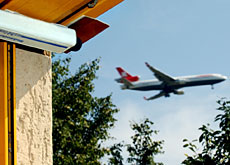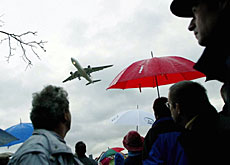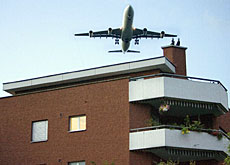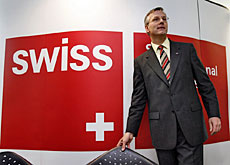Zurich votes on airport restrictions

Voters in canton Zurich will decide on Sunday whether to limit flight movements at Switzerland's biggest airport to counter noise and air pollution.
Zurich’s runways handled over 260,000 takeoffs and landings last year but that number could increase to 450,000 by 2030 to meet growing demand. Critics are warning that restrictions could cost the economy billions.
Many residents under flight paths complain their quality of life is damaged by air traffic. This was made worse in October 2003 when Germany banned night and weekend flights to Zurich over the southern part of its territory, redirecting planes over populated areas in the canton.
In July 2004, a people’s initiative calling for a “realistic airport policy” gathered enough signatures (21,464) to force a cantonal vote on limiting movements to 250,000 a year and extending an existing night time ban.
The cantonal authorities refused to back this model and instead put forward a noise pollution index that would apply the brakes if enough households were affected. This would probably happen if annual movements reached 320,000.
Voters will decide whether to accept or reject each alternative on Sunday.
Critics of both proposals – led by Swiss International Air Lines, Zurich airport operator Unique and the Swiss Business Federation economiesuisse – say limits would be disastrous for the economy.
Swiss timetable expansion
In January, economiesuisse claimed limiting annual movements to 250,000 would cost business up to SFr7.5 billion ($6.8 billion). Unique expects a noise pollution compensation bill of up to SFr1.2 billion and fears limits could damage Zurich’s status as an international hub.
Sunday’s vote coincides with Swiss International Air Lines introducing flights from Zurich direct to Delhi as part of a timetable expansion that will soon include Shanghai and other destinations.
Swiss CEO Christoph Franz has little sympathy for those supporting flight limitations.
“Decisions about the number of movements should not just be down to people who build their homes near flight paths. The whole Swiss economy benefits substantially from good air traffic connections,” he told swissinfo in August.
But the noise protestors, armed with research connecting noise with poor health and falling property values, are undaunted by accusations of self-interest.
“No economic impact”
“Opponents say that flight limits will damage the economy but there is quite a lot of evidence to say this is not the case,” Stefan Wey, president of the noise protestor’s organisation, told swissinfo.
“Since the grounding of Swissair [the former national carrier] in 2001 there has been a continuous reduction in flight movements but the economy has never prospered as much.”
Wey also claimed that around 40,000 movements are private flights carrying an average of 1.4 people. And he added that improved international train connections offer a viable alternative to short-haul flights.
Wey believes the noise pollution index is unrealistic and unworkable.
Ironically, a member of one of the anti-noise groups supporting the initiative was chosen on Friday to become the new head of Zurich airport.
According to the Saturday edition of the Tages-Anzeiger newspaper, Thomas Kern is formally still a member of the group, IG Chapf. It claims to represent the interests of residents in Zumikon, where Kern lives.
swissinfo, Matthew Allen in Zurich
Zurich airport handled 260,786 flight movements in 2006 (down 2.5% on the previous year).
However, with 130,912 movements recorded in the first half of 2007 and Swiss expanding its timetable, the airport expects modest growth this year.
The number of passengers passing through the airport grew from nearly 18 million in 2005 to 19,237,216 in 2006.
In the first half of this year 9,702,855 passengers made use of the airport.
Zurich airport already has some of the strictest night time flying rules in Europe.
Since 1972, flights have been banned between midnight and 5.30am. In addition, only low noise aircraft can fly between 10pm and midnight and 5.30am to 6am.
In 2000 the Swiss Federal Office of Civil Aviation (FOCA) recommended a complete review of civilian aviation in the country called the Sectorial Aviation Infrastructure Plan (SAIP).
It aims to set out the purpose, required perimeter, usage, equipment requirements and operating conditions for every airport. It will also look at a range of related topics such as security and the environmental impact of air transport.
The plan will also outline how Zurich airport can cope with an expected increase in air traffic demand in the coming years. Proposals include rearranging the runways to a parallel system.
FOCA originally intended to make its recommendations by the end of this year, but the next set of talks over Zurich airport have been scheduled for April 2008. The government is expected to make recommendations by the end of 2009.

In compliance with the JTI standards
More: SWI swissinfo.ch certified by the Journalism Trust Initiative





You can find an overview of ongoing debates with our journalists here. Please join us!
If you want to start a conversation about a topic raised in this article or want to report factual errors, email us at english@swissinfo.ch.